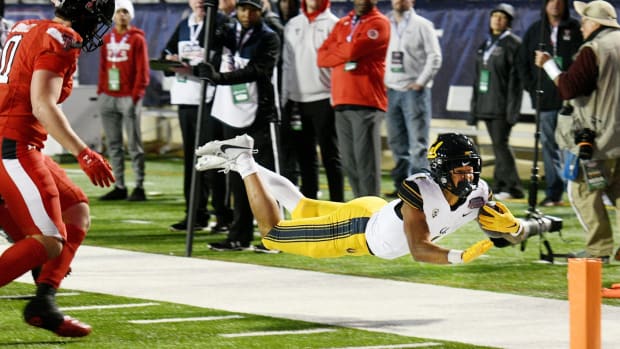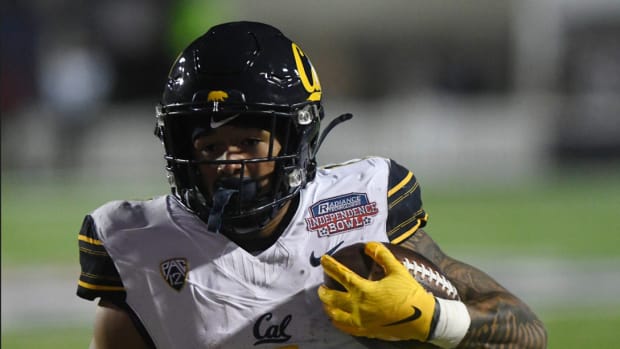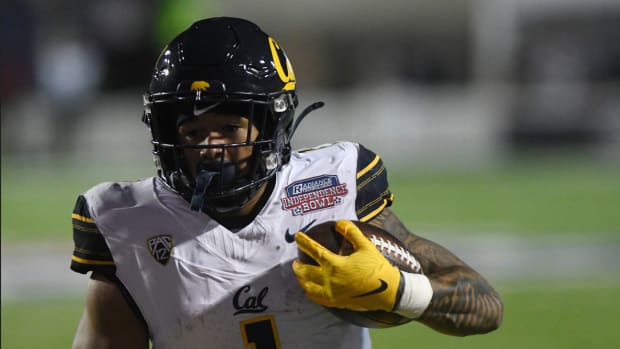Cal Football: Cal Might Call Itself Quarterback U. -- If You Go Back to 2000
Sports Illustrated cruched a bunch of numbers to decide which college could call itself Quarterback U. Although Cal did not make the top-10 if the data went back just 10 years, the Golden Bears came up as the No. 2 school for quarterbacks over the past 20 years.
This was based on how quarterbacks from each school did in the NFL.
(Click here for whether Cal can call itself Running Back U.)
For quarterbacks, Oklahoma came out on top in the 10-year data cruching shown here:
1. Oklahoma, 28 points
2. Florida State, 20
3(tie). Auburn, 17
3(tie). Louisville, 17
5(tie). Texas A&M, 14
5(tie). USC, 14
7(tie). Baylor, 12
7(tie). N.. State, 12
7(tie). Texas Tech, 12
10(tie). Missouri, 11
10(tie). Oklahoma State, 11
10(tie). Stanford, 11
-
But in the unofficial 20-year span for quarterbacks, Cal come out second behind only USC.
1. USC, 47 points
2. Cal, 36
3. Michigan, 34
4(tie). Louisville, 28
4(tie). Oklahoma, 28
6. Oregon, 27
7(tie). Auburn, 25
7(tie). Florida State, 25
9. N.C. State, 23
10. Boston College, 20
-
Sports Illustrated explained Cal's rise to the No. 2 spot in Quarterback U. in the 20-year span this way:
Cal's standing would be carried by Aaron Rodgers and helped along by Jared Goff and Kyle Boller (a first-round disappointment, but one who still made 47 career starts).
All three were first-round NFL draft choices -- Boller was the 19th overall pick (Ravens) in 2003, Rodgers (pictured below) was the 24th overall selection (Packers) in 2005, and Goff was the first overal pick (Rams) in 2016. Also former Cal quarterback Davis Webb was taken in the third round of the 2017 NFL draft by the Giants.
Boller started 47 NFL games, Goff has started 54 games, and Rodgers has started 174 games. Rodgers was also the league MVP in 2011 and 2014, which also counts in the SI point system. Davis has not started any NFL games, but he might some day.
It's possible Cal's standing in this kind of ranking system might rise further if current Cal quarterback Chase Garbers becomes a pro quarterback. That does not sound impossible after seeing the improvement he made from his redshirt freshman season to his redshirt sophomore season.
Here is a video of Garbers during Cal's abbreviated spring workouts, discussing the Bears' new offense:
So what was the the basis of SI's ranking system? Here is how Sports Illustrated explained its methodology:
We came up with a scoring system that balanced not just the quantity of players programs put into the NFL, but the quality of those players' careers. One measure we used is draft position—an inexact but still relevant measure of a player's approximate value when he left college. We credited players for career games started. But rather than assigning a point value to every game started, which would weigh too heavily in favor of older players, we lessened that effect by using ranges.
We also awarded points for the highest achievements (MVP, and for non-quarterbacks, Offensive/Defensive Player of the Year and All-Pro) and awarded a smaller amount of credit for Rookie of the Year, an indication of a player's preparedness when entering the league. (We made the decision to exclude the Pro Bowl. Between fan voting and the league's need to dig deep into the pool of alternates with so many players dropping out annually, there's been a reduction in the legitimacy of that achievement.)
For all positions in this series, scoring is based on alumni who entered the NFL between 2010 and 2019 and were either (1) drafted or (2) undrafted but appeared in at least one game. Players who transferred during their college careers are counted only as part of the last program they played for. Players are only credited for the position at which they were drafted. Our full scoring system is at the bottom of this article.
SI Scoring Sytem
DRAFT POSITION
Top 10: 4 points
Round 1 (non-top 10): 3 points
Rounds 2-3: 2 points
Rounds 4-7: 1 point
Undrafted: 0 points
-
NFL GAMES STARTED
80-plus: 5 points
48 to 79: 4 points
16 to 47: 3 points
5 to 15: 2 points
1 to 4: 1 point
-
NFL AWARDS
Offensive Player of the Year: 4 points






